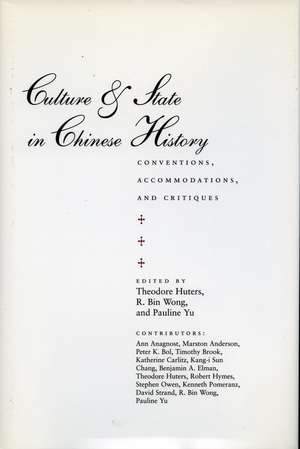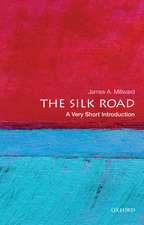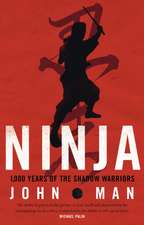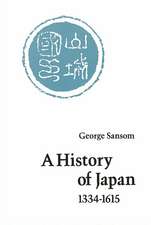Culture and State in Chinese History: Conventions, Accommodations, and Critiques: Irvine Studies in the Humanities
Editat de Theodore Huters, R. Wong, Pauline Yuen Limba Engleză Hardback – 30 noi 1997
Many observers of late imperial China have noted the relatively small size of the state in comparison to the geographic size and large population of China and have advanced various theories to account for the ability of the state to maintain itself in power. One of the more enduring explanations has been that the Chinese state, despite its limited material capacities, possessed strong ideological powers and was able to influence cultural norms in ways that elicited allegiance and responded to the desire for order.
The fourteen papers in this volume re-examine the assumptions of how state power functioned, particularly the assumption of a sharp divide between state and society. The general conclusion is that the state was only one actor—albeit a powerful one—in a culture that elites and commoners could shape, either in cooperation with the state or in competition with it. The temporal range of the papers extends from the twelfth to the twentieth century, though most of the papers deal with the Ming and Qing dynasties.
The book is in four parts. Part I deals with philosophical, historiographical, and literary debates and their relation to the late imperial state; Part II with the multiple roles of officials, elites, specialists, and commoners in constructing norms of religious beliefs and practices. Part III presents criticisms by late imperial intellectuals of both state policies and social conventions, and examines official efforts to incorporate and utilize elite commitments to Confucian views of political and cultural order. Part IV discusses ways in which the twentieth-century Chinese political order emerged from a trajectory defined in part by the intersection of late imperial practices with Western categories of knowledge.
The fourteen papers in this volume re-examine the assumptions of how state power functioned, particularly the assumption of a sharp divide between state and society. The general conclusion is that the state was only one actor—albeit a powerful one—in a culture that elites and commoners could shape, either in cooperation with the state or in competition with it. The temporal range of the papers extends from the twelfth to the twentieth century, though most of the papers deal with the Ming and Qing dynasties.
The book is in four parts. Part I deals with philosophical, historiographical, and literary debates and their relation to the late imperial state; Part II with the multiple roles of officials, elites, specialists, and commoners in constructing norms of religious beliefs and practices. Part III presents criticisms by late imperial intellectuals of both state policies and social conventions, and examines official efforts to incorporate and utilize elite commitments to Confucian views of political and cultural order. Part IV discusses ways in which the twentieth-century Chinese political order emerged from a trajectory defined in part by the intersection of late imperial practices with Western categories of knowledge.
Preț: 605.25 lei
Preț vechi: 747.22 lei
-19% Nou
Puncte Express: 908
Preț estimativ în valută:
115.83€ • 125.77$ • 97.30£
115.83€ • 125.77$ • 97.30£
Carte tipărită la comandă
Livrare economică 22 aprilie-06 mai
Preluare comenzi: 021 569.72.76
Specificații
ISBN-13: 9780804728676
ISBN-10: 0804728674
Pagini: 516
Dimensiuni: 152 x 229 x 36 mm
Greutate: 0.97 kg
Ediția:1
Editura: Stanford University Press
Colecția Stanford University Press
Seria Irvine Studies in the Humanities
ISBN-10: 0804728674
Pagini: 516
Dimensiuni: 152 x 229 x 36 mm
Greutate: 0.97 kg
Ediția:1
Editura: Stanford University Press
Colecția Stanford University Press
Seria Irvine Studies in the Humanities
Notă biografică
Professor Theodore Huters is Professor of Modern Chinese Literature at the University of California, Los Angeles. R. Bin Wang is Professor of History at the University of California, Irvine. Pauline Yu is Dean of Humanities and Professor of Chinese Literature at the University of California, Los Angeles.
Descriere
Combining the efforts of scholars of history, literature and the social sciences, the essays collected in this volume explore some of the ways culture interacted with political power in late imperial China.





















